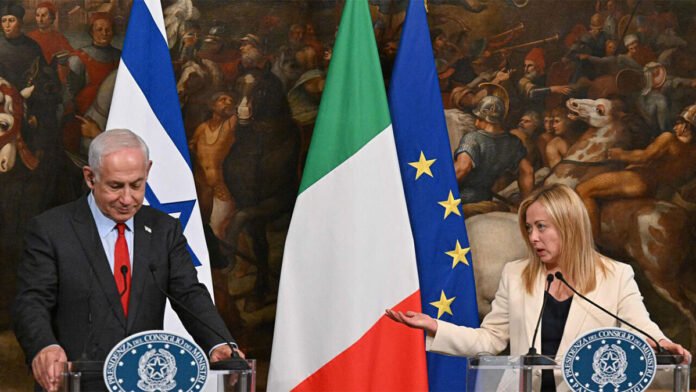A major espionage scandal has erupted in Italy, implicating Israel’s foreign intelligence agency Mossad in what Italian officials are calling “a threat to democracy.” The operation allegedly involved the systematic hacking of government databases and collection of sensitive information on high-ranking Italian officials, including Prime Minister Giorgia Meloni.
The Digital Dragnet: How a Private Intelligence Firm Exposed the Shadowy World of Modern Espionage

In the narrow streets of Milan, far from the marble halls of Rome’s government buildings, a small private intelligence firm called Equalize was allegedly pulling off one of the most audacious hacking operations in modern European history. What began as a local cybersecurity breach has erupted into an international scandal that reads like a John le Carré novel – except every character is real, and every threat is present.
Last Wednesday, Italian authorities revealed a sprawling network of digital espionage that has shaken the foundations of European security. At its centre: a cast of former police officers, intelligence operatives, and hackers who allegedly turned their expertise against the very institutions they once served.
The scope is breathtaking. Prime Minister Giorgia Meloni’s personal data, compromised. The Interior Ministry’s servers, breached. The Vatican, implicated. Mossad agents, meeting in Milan office buildings. And at the heart of it all, a €1 million contract to track Vladimir Putin’s inner circle and the shadowy Wagner Group’s finances.
The focus is on ‘Equalize’, a Milan-based private intelligence firm staffed by former security service officials. The company is accused of breaching servers of Italy’s Interior Ministry and police databases between 2019 and 2024, collecting classified information on thousands of prominent Italians – from politicians and entrepreneurs to celebrities.
Italian law enforcement has already arrested four individuals, with dozens more under investigation. Defence Minister Guido Crosetto has called for an urgent parliamentary probe, warning that the exposed personal information may be “just the tip of the iceberg.”
The man at the centre of this web, Nunzio Samuele Calamucci, is no ordinary suspect. A self-proclaimed veteran of Anonymous who once boasted of penetrating the Pentagon’s defences, he now stands accused of orchestrating what Italian media have dubbed “a conspiracy of the highest level.” His firm, Equalize, didn’t just hack – it allegedly built a sophisticated marketplace of secrets, where everything from politicians’ private lives to state intelligence was available for the right price.
The confidential data, which was allegedly sold to clients or used to blackmail businessmen and politicians, including former Milan Mayor Letizia Moratti, went back to at least 2019 and continued up to March 2024, a court document seen by Reuters showed.
The Milan prosecutors allege the business intelligence agency tapped into three key databases: one gathering alerts over suspicious financial activities; one used by the national tax agency with citizens’ bank transactions, utility bills, income statements; and the police investigations’ database.
According to prosecutor documents, one of the suspects, Nunzio Samuele Calamucci, had a “huge amount of data to manage equal to at least 15 terabytes.”
The country’s anti-mafia prosecutor, Giovanni Melillo, told the press conference that the case had revealed “a gigantic and alarming market of confidential data.”
It is claimed up to 800 thousand people were spied on.

The evidence reads like a modern spy thriller. Police wiretaps captured meetings between Calamucci’s team and two Israeli operatives in a Milan office in February 2023. The topic of discussion? A million-euro operation targeting Russian oligarchs and tracking dark money flowing to the Wagner Group – information destined, bizarrely, for Vatican eyes. The same tapes revealed an offer to trade explosive documents from the EU’s Qatargate scandal, suggesting a vast network of information trafficking stretching from Brussels to the Holy See.
But what makes this case truly extraordinary is its reach into the machinery of state power itself. Former police investigators, including Carmine Gallo, allegedly turned their badges into skeleton keys, using their security clearances to access government databases at will. From their offices in Milan, they reportedly built a network extending to Colchester, England, where dozens of hackers worked in their service, using servers strategically placed in Lithuania to evade detection.
The Israeli Connection

According to intercepted communications reported by Politico and Corriere Della Sera, two Israeli intelligence agents met with Equalize representatives at their Milan office in February 2023. The meeting, coordinated by Lorenzo De Marcio, a senior police official with ties to Italian intelligence, allegedly centred on a proposed €1 million deal.
Politico reported that according to the leaked wiretaps, members of the hacking network met with two Israeli agents at the firm’s office in Milan in February 2023 to discuss a deal worth 1 million euros.
“The job was a cyber operation against Russian targets, including President Vladimir Putin’s unidentified ‘right-hand man,’ and unearthing the financial trail leading from the bank accounts of wealthy figures to the Russian mercenary group Wagner. The information was then supposed to be passed on to the Vatican,” Politico wrote.
In a report released on Wednesday by Italian newspaper Corriere Della Sera, two unidentified Israeli intelligence agents were intercepted while visiting the firm.
In 2022, Wagner – founded by Yevgeny Prigozhin – mobilised mercenaries to fight on behalf of Russia against Ukraine. Prigozhin was assassinated shortly after carrying out a mutiny where forces were sent to Moscow.
According to the leaked wiretaps, the Israelis had offered to provide original documents from the “Qatargate” scandal, in which European Parliament officials, lobbyists, and their families were bribed to act on behalf of the gas-rich Gulf state in Brussels, Politico added.
The Israelis also allegedly offered Equalize information on the “illicit trafficking of Iranian gas with Italian companies,” potentially benefiting one of its major clients, national energy company Eni.
The defenders of our current system will argue that intelligence agencies need private sector partnerships to stay effective in our digital age. They’ll point to national security concerns and the need for technological expertise. This is a convenient fiction that serves only to obscure a darker truth: We’ve created a parallel power structure that operates beyond democratic oversight, where former spies monetize their skills and connections in the private sector while maintaining ties to their old agencies.
Remember when surveillance was supposed to be about catching terrorists? Yet here we are, with private firms allegedly hoarding compromising information on elected officials, entrepreneurs, and public figures – all for sale to the highest bidder. The going rate? A cool million euros for operations targeting Russian figures and tracking Wagner Group finances, according to the wiretaps.
This isn’t just mission creep; it’s mission leap.

Defense Minister Guido Crosetto’s warning that the exposed information is merely “the tip of the iceberg” takes on a chilling new meaning when we consider the scale of the operation. This wasn’t just about gathering data – it was about power. The ability to blackmail, pressure, or destroy public figures at will. As Foreign Minister Antonio Tajani put it, this was an “unacceptable” assault on democracy itself.
This scandal exposes not just stolen data but the rot at the heart of our intelligence apparatus: the commodification of surveillance and the privatisation of state power.
Italian Foreign Minister Antonio Tajani said Wednesday that the “unacceptable” hack, which intended “to blackmail, attack or pressure” politicians, and the hackers’ connections beyond national borders made it “much more serious.”
Tajani has ordered the creation of a task force to protect his ministry and Italy’s embassies abroad.
Other countries are likely to be pulled into the Italian investigation.

Calamucci, who previously boasted of penetrating the Pentagon with the Anonymous hacktivist collective, frequently referenced dozens of hackers working for him in Colchester, England. The firm also made use of servers in the United States and Lithuania, where they felt they were less vulnerable, according to leaked documents.
Prosecutors have ordered the seizure of a server in Lithuania and are evaluating whether to make a request to investigators in the U.K., according to reports in Italian media.
Now, as Italian prosecutors work to untangle this web, the four suspects under house arrest maintain a telling silence. Their lawyers speak of “empirically unfeasible” allegations, yet the evidence continues to mount. Just yesterday, prosecutors ordered the seizure of servers in Lithuania, with Britain likely next in their sights.
The four people under house arrest as part of a probe into alleged illegal access to state databases, and are investigating dozens, including Leonardo Maria Del Vecchio, son of the late billionaire founder of Luxottica. Leonardo Maria Del Vecchio is the son of Leonardo Del Vecchio, who founded Ray Ban-owner Luxottica. The tycoon died in 2022.
A lawyer for Leonardo Maria Del Vecchio said he was “eagerly awaiting the completion of preliminary investigations to be able to prove he has nothing to do with the events in question and that charges laid against him have no basis.
“He seems to be rather a victim given initial allegations and the negative outcome of the search conducted,” lawyer Maria Emanuela Mascalchi said in a statement.
Milanese authorities placed dozens, including Leonardo Maria Del Vecchio, pictured below, under investigation © Angel Weiss/AFP/Getty Images The timing of this scandal is particularly significant, emerging as it does against the backdrop of growing concerns about private intelligence firms operating in the shadows of state power. The alleged targeting of Wagner Group financials gains extra weight when we consider the fate of Yevgeny Prigozhin, whose challenge to Moscow’s authority ended in flames.
The timing of this scandal is particularly significant, emerging as it does against the backdrop of growing concerns about private intelligence firms operating in the shadows of state power. The alleged targeting of Wagner Group financials gains extra weight when we consider the fate of Yevgeny Prigozhin, whose challenge to Moscow’s authority ended in flames.
What this scandal reveals isn’t just a breach of security – it’s a glimpse into the murky world where private intelligence firms have become the hired guns of the digital age. From Milan to Moscow, from the Vatican to London’s financial district, these modern-day mercenaries operate with near impunity, armed not with bullets but with bytes.
The implications stretch far beyond Italy’s borders. When a private firm in Milan can penetrate national security databases, trade in state secrets, and broker deals between intelligence agencies, we must ask ourselves: who really holds power in our digital age? The democratically elected governments we entrust with our security, or these shadow operators who trade in the currency of information?
As prosecutors work to unravel this labyrinth, four suspects sit under house arrest, their silence speaks volumes. Their lawyers’ carefully worded statements about “empirically unfeasible” allegations ring hollow against the mountain of evidence – wiretaps, server logs, and the damning paper trail of their international operations.
The creation of Tajani’s emergency task force to protect Italy’s embassies abroad isn’t just a bureaucratic response – it’s an admission that the traditional boundaries between private and state intelligence have completely broken down. When a firm like Equalize can allegedly access everything from bank transactions to police investigations, from politicians’ private data to state secrets, the very foundation of national security becomes questionable.
Italian media outlets described the case as a “conspiracy of the highest level that involves members of the mafia and officials in the intelligence services, along with foreign intelligence services including the Mossad.”
Giorgia Meloni described the plot as “unacceptable” and a “threat to democracy.”

Perhaps most disturbing is how this scandal illuminates the commodification of state secrets. Information about Iranian gas deals, Russian oligarchs’ finances, and European political corruption wasn’t just stolen – it was packaged and traded like any other commodity. The €1 million price tag for the Wagner Group operation suggests a thriving market for this digital contraband.
As Italian authorities continue their investigation, one thing becomes clear: this is not just about reforming cybersecurity protocols or arresting a few rogue operators. This is about confronting a fundamental shift in how power operates in our interconnected world. The walls between private and state intelligence have crumbled, leaving us to question who really guards the guardians in our digital age.
The answer to that question may determine not just Italy’s future security, but the very nature of state power in an era where information has become the ultimate weapon. As this investigation unfolds, we would do well to remember that today’s headlines about Milan hackers and Vatican intrigue are tomorrow’s blueprint for how power really operates in our digital century.
Support Independent Journalism Today
Our unwavering dedication is to provide you with unbiased news, diverse perspectives, and insightful opinions. We're on a mission to ensure that those in positions of power are held accountable for their actions, but we can't do it alone. Labour Heartlands is primarily funded by me, Paul Knaggs, and by the generous contributions of readers like you. Your donations keep us going and help us uphold the principles of independent journalism. Join us in our quest for truth, transparency, and accountability – donate today and be a part of our mission!
Like everyone else, we're facing challenges, and we need your help to stay online and continue providing crucial journalism. Every contribution, no matter how small, goes a long way in helping us thrive. By becoming one of our donors, you become a vital part of our mission to uncover the truth and uphold the values of democracy.
While we maintain our independence from political affiliations, we stand united against corruption, injustice, and the erosion of free speech, truth, and democracy. We believe in the power of accurate information in a democracy, and we consider facts non-negotiable.
Your support, no matter the amount, can make a significant impact. Together, we can make a difference and continue our journey toward a more informed and just society.
Thank you for supporting Labour Heartlands









